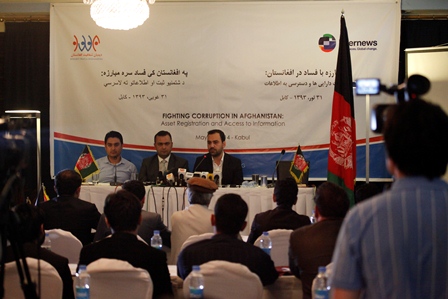Afghan anti-corruption watchdog stresses upon asset registration
KABUL - An Afghan anti-corruption group has identified weakness in the process of asset registration of high ranking officials as a key impediment in the country’s fight against corruption and detection of illicit enrichment.
“Asset registration is weak in Afghanistan and the Government has not been able to meet its commitments in this regard to a large extent,” said the Director of Communications and Advocacy for the non-governmental organization Integrity Watch Afghanistan (IWA), Sayd Ikram Afzali, during a press conference in the capital, Kabul, on Wednesday.
He reminded that the Afghan Government had committed during the Kabul International Conference in 2010 and the Tokyo Conference in 2012 – two major gatherings in which the Government of Afghanistan vowed to curb corruption to ensure continued international support – to implement asset registration as a major step towards fighting corruption.
Mr. Afzali also highlighted that the Afghan Constitution, under article 154, outlined the mandatory registration, review and publication of the assets owned by the President, the Vice-Presidents, ministers, members of the Supreme Court and the Attorney General, prior to and after their terms of office.
According to the Transparency International’s 2013 Corruption Perception Index, Afghanistan continues to be ranked towards the very bottom of the index, which ranks countries and territories based on how corrupt their public sector is perceived to be. Afghanistan is listed in the 175th spot out of 177 countries, with the Democratic People's Republic of Korea and Somalia taking the two bottom spots.
Afghanistan is also a signatory to United Nations Convention against Corruption (UNCAC), which makes it mandatory for countries to require that public officials declare their assets. In addition, the Convention requires that those states which are parties to the treaty specifically make a lack of asset registration and increases in their wealth accumulation without notification a punishable offence.
In his remarks, Mr. Afzali emphasized that the Afghan Government must take into account its commitments to the international community in relation UNCAC and abide by the promises made during the international conferences in regards to fighting corruption in the country.
The Afghan Government established the High Office of Oversight (HOO) in 2008 to fight corruption and register the assets of high-ranking government officials and members of Afghan parliament. However, Mr. Afzali said that the HOO registered the assets of just 70 government officials during 2012 and did not complete other processes such as the declaration and publication of lists of assets nor did it proceed with any judicial process in any cases of fraud or other violations of the law.
He also demanded the establishment of a strong system of corruption control as well as greater capacity-building at HOO, along with limited exemptions for asset registration and verification.
The IWA’s findings follow in the wake of a recent report of the independent Joint Anti-Corruption Monitoring and Evaluation Committee (MEC), in which the UN-backed body criticized the Afghan Government for not effectively implementing asset registration and verificiation procedures for high ranking Afghan officials, warning that such paving the way for embezzlement.
The MEC was established with the joint efforts of Afghan government and International community after the London Conference on Afghanistan in 2010. It is made up of three senior anti-corruption experts appointed on the Afghan Government’s recommendation and three others on the recommendation of the United Nations, on behalf of the international community. It is mandated to develop anti-corruption recommendations and benchmarks; monitor and evaluate the government and international community efforts to fight corruption; and to report to the President, Parliament, people and international community. It releases reports of its assessments and findings every six months.
Every six months, the MEC submits a report of its assessments and findings of the agreed-upon benchmarks to the President, Parliament, and people of Afghanistan through the media.
 UN
UN







